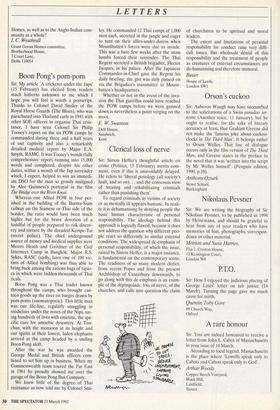Boon Pong's porn-porn
Sir: My article 'A cricketer under the Japs' (15 February) has elicited from readers much hitherto unknown to me which I hope you will feel is worth a postscript. Thanks to Colonel David Smiley of the Royal Horse Guards (The Blues), who was parachuted into Thailand early in 1945 with other SOE officers to organise Thai resis- tance, I have seen Colonel Sir Philip Toosey's report on the six POW camps he commanded during three and a half years of 'our captivity and also a remarkably detailed medical report by Major E.A.
Smyth, RAMC. It was Toosey's wonderfully comprehensive report running into 15,000 words and completed, despite his other duties, within a month of the Jap surrender which, I expect, helped to win an immedi- ate DSO for the man so grossly maligned by Alec Guinness's portrayal in the film The Bridge over the River Kwai.
Whereas one Allied POW in four per- ished in the building of the Burma-Siam railway on the Siamese or Thai side of the border, the ratio would have been much higher but for the brave devotion of a handful of people prepared to risk discov- ery and torture by the dreaded Kempe-Tai (secret police). The chief underground source of money and medical supplies were Messrs Heath and Gairdner of the Civil Internees Camp in Bangkok. Major R.S.
Sykes, RASC (sadly, later one of 100 vic- tims of Allied bombing) was thus able to bring back among the rations bags of tapio- ca in which were hidden thousands of Thai ticals.
Boon Pong was a Thai trader known throughout the camps, who brought can- teen goods up the river on barges drawn by pom-poms (onomatopoeic). This little man was our life-line, regularly smuggling in medicines under the noses of the Nips, sav- ing hundreds of lives with emetine, the spe- cific cure for amoebic dysentery. At Ton- chan, with the monsoon at its height and our spirits at their lowest, laden elephants arrived at the camp headed by a smiling Boon Pong aloft.
After the war he was awarded the George Medal and British officers com- bined to set him up in business. When my Commonwealth team toured the Far East in 1961 he proudly showed me over the garage of the Boon Pong Bus Company.
We knew little of the degree of Thai resistance as now told me by Colonel Smi-
ley. He commanded 12 Thai camps of 1,000 men each, secreted in the jungle and eager to turn on their allies-under-duress when Mountbatten's forces were due to invade. This was a bare few weeks after the atom bombs forced their surrender. The Thai Regent secreted a British brigadier, Hector Jacques, in his palace. After the Japanese Commander-in-Chief gave the Regent his daily briefing, the gist was duly passed on via the Brigadier's transmitter to Mount- batten's headquarters.
Whether or not in the event of the inva- sion the Thai guerillas could have reached the POW camps before we were gunned down is nevertheless a point verging on the moot.
E. W. Swanton
Delf House, Sandwich, Kent


























































 Previous page
Previous page